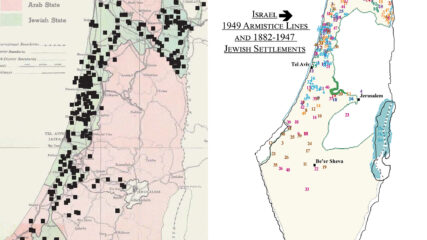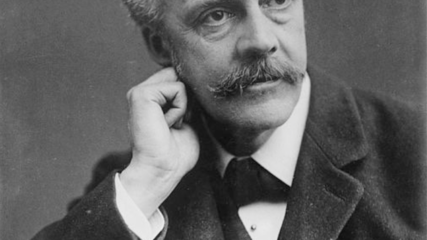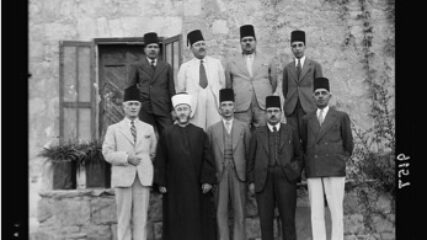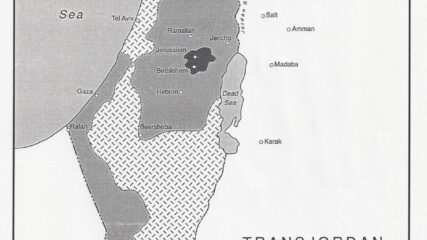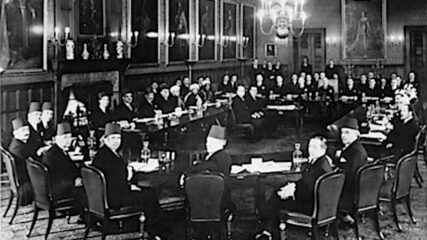January-March 1919
Emir Faisal, on behalf of the Sharif of Mecca, and Chaim Weizmann, on behalf of the Zionist Organization, exchange recognition of cordiality and kinship between a future Arab state and Palestine, where Zionists seek to establish their national home. They offer each other mutual assistance.
July 24, 1922
International legitimacy is granted to establish a Jewish National Home in Palestine. Rules for its establishment clearly give Jews in Palestine distinct advantages over the local Arab population.
February 5, 1930
Two letters detail how Arab peasants are sometimes swindled out of their lands by Arab land brokers and effendis, noting economic harm to them, and how they learn to avoid landlords and sell directly to Jewish buyers. Intra-Arab communal tension rises.
1931-1949
Palestinian Arabs' own words, backed by the observations of British and Zionist officials, show that their awareness that their own people were helping the Zionist causes through land sales, often displacing Arab peasants.
1926-1948
JNF meeting minutes and other statements show the strategic approach to Jewish land purchases throughout the British Mandate period.
January 10, 1936
Five Arab political parties sent a memorandum of protest to the British asking for a halt to Jewish immigration, a stoppage in Arab land sales to Jews,and a measure of self-determination. The British did not change their policies in these three areas. In 1939, they did severely limit Jewish land purchases and severely curtailed Jewish immigration.
January 7, 1937
Ben-Gurion recognized that Arab opposition to Zionism is a national feeling and that Palestinian Arab leadership had done little to help the majority impoverished peasant population.
October 11, 1938
At the conclusion of a four-day conference in Cairo, Egypt, Arab leaders adopt the Resolutions of the Inter-Parliamentary Congress. The conference and resolutions are a response to the British Peel Commission Report of 1937.
July 7, 1937
A map shows the partition of Palestine proposed by the Peel Commission in 1937.
September 30, 1938
This document was secured at the Central Zionist Archives in Jerusalem. Less than a year before Hitler invaded Poland, Arab leaders with an interest in Palestine are starkly disappointed that the the German government did not go to war against the Zionists in Palestine. The same leaders give the Zionist national builders high marks for their perseverance against terrorist bands in the Palestinian countryside. They worry that unless Arab states come to the Palestinians’ assistance, Palestine will be lost to the Zionists. A remarkable assessment for Palestinian Arab leaders and their supporters.
May 23, 1939
Zionist leaders—David Ben-Gurion, Chaim Weizmann and Eliezer Kaplan—learning of the British intent to limit severely the Jewish national home’s growth. Increasingly, they are also aware of the German government’s hostilities towards European Jewry.
1947
Irrefutable evidence shows Palestinian Arab collaboration with Zionists during the British Mandate greatly assisted Jewish state building. Cohen further asserts a general absence among Palestinians of a sense of national feeling, with loyalties instead tied to families, villages and other localities. Quite certainly without Palestinian Arab collaboration, Zionists would not have succeeded in building a nucleus for the Jewish state. Arabic newspapers in Palestine and British scrutiny show the constancy of the Arab population's engagement with the Zionists, and this included Arabs resident inside Palestine.
October 26, 1947
No document better reveals the hostility which most Arab leaders and Arab states had in 1947 for Zionism and for a possible Jewish state. The Saudi King notes "that US support for Zionists in Palestine is an unfriendly act directed against the Arabs." The King's views were totally supported by US State Department officials including Loy Henderson and George Kennan who advocated strongly against Truman's support of a Jewish state.
December 25, 2022
In this 46-minute video recorded Dec. 25, 2022, two emeritus professors from the Hebrew University of Jerusalem joined President Ken Stein to discuss the key period when the Zionists succeeded in creating and securing a...
June 19, 1947
The Status-Quo Agreement is an understanding reached between David Ben-Gurion, then the chairman of the Jewish Agency Executive, and the religious parties in the period before Israel became a state.
August 31, 1947
Earlier in 1947, Great Britain turned the future of the Palestine Mandate over to the newly established United Nations. Then in August 1947, the UN suggested that establishing an Arab and Jewish state with a federal union would be the best solution for the communal unrest there.
November 29, 1947
The UN suggested partition of Palestine into Arab and Jewish states with an economic union between them and an internationalization of Jerusalem.
September 29, 1947
September 29, 1947 The Arab Higher Committee for Palestine formally rejects the U.N. Special Committee on Palestine’s partition plan, which advocates for the division of the land into a separate Jewish and Arab states and...
Spring 1949
The area of Israel expanded and the potential area for a Palestinian Arab state decreased because of the 1948-49 war, Israel’s War of Independence. The Arab rejection of the 1947 U.N. partition plan thus hurt...
February 24, 1948
In March 1948, two months before Israel’s establishment, the US State Department sought to reverse the US vote in favor of partition for the creation of Arab and Jewish states in Palestine.
June 7, 2024
Musa Alami, “The Lesson of Palestine,” Middle East Journal, Volume 3, No. 4, October 1949, pp. 373-405 Reprinted with permission of The Middle East Institute, October 2021 In this 1949 article published in Middle East...
1952
With crisp analysis, Haganah Commander Yigal Allon, later a Prime Minister of Israel attributes Israel's successes to multiple factors including the absence of a centralized Arab command, limited Arab military training, underestimating the potential fighting capabilities of local Arabs, and Israel's success in integrating its citizens into the war effort.


